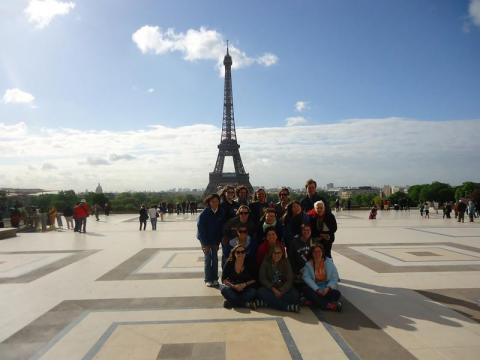
Students journeyed to Paris and Berlin as the culmination of a spring semester course "Tale of Two Cities: Paris, Berlin and Modernism" taught by LLL associate professors Ann Rider and Keri Yousif.

Students journeyed to Paris and Berlin as the culmination of a spring semester course "Tale of Two Cities: Paris, Berlin and Modernism" taught by LLL associate professors Ann Rider and Keri Yousif.
As Ashlee Vitz stood in the wings of the Paris Opera House instead of listening to the guide explain the backstage with the rest of the Indiana State University students, the 2008 theater graduate stared at the stage, the focal point for thousands of empty chairs.
She slid away from the group and walked onto the storied stage. She closed her eyes, imagining people filled the seats, while tears trembled on her lashes.
\"I knew I would regret it if I didn\'t,\" said Vitz, a 2008 theater graduate, about her solo walk onto the stage.
Vitz, a graduate student studying French in Indiana State\'s languages, literatures and linguistics (LLL) department , journeyed to Paris and Berlin as the culmination of a spring semester course \"Tale of Two Cities: Paris, Berlin and Modernism\" taught by LLL associate professors Ann Rider and Keri Yousif.
\"We wanted to experiment with a course that presents culture through the lenses of different disciplines that we both engage,\" Rider said. \"Modernism is a topic that allowed us to do that, since it incorporates art, film, literature, music and also new theories of urban life, culture and society.\"The class examined the two cities\' changes from 1840 to 1933 as citizens migrated from farms to the cities as factories began to dominate working life; political changes birthed societal unrest and upheaval, which art mirrored as artists explored increasing freedoms. Indiana State students read Gustave Flaubert\'s \"Sentimental Education,\" Bertolt Brecht\'s \"Threepenny Opera,\" Charles Baudelaire\'s \"The Parisian Prowler\" and Frank Wedekind\'s \"Spring Awakening\" as part of the required texts for the class.
\"For us, we didn\'t want to take tourists. We didn\'t want to be tourists,\" Yousif said. \"We wanted to be students.\"
Students made connections between the places they visited with the different pieces they read, Yousif said. As they walked across a bridge in Paris, the students remembered it as a place where one of Flaubert\'s characters attempted suicide. After spending a semester studying about the cities through the various texts, Yousif said, \"They weren\'t tourists.\"
From art to architecture, the modern movement left its mark on the two cities, a mark that shows in sharp relief with the surrounding history of the cities, including the opera house.
\"The tour guide said people in Paris either loved it or hated it,\" Vitz said about the opera house. \"It\'s a gigantic glass structure in the middle of cobblestone history.\"
From Sacre Coeur, the Eiffel Tower, an overnight train ride from Paris to Berlin, to tours of Berlin, visits to the Bauhaus-Archiv Museum and the Holocaust Memorial, Jared Hutson, then a senior biology major, said he was struck by the history.
\"We were seeing the structures, the buildings from Medieval Roman ruins, old cathedrals,\" he said. \"In America, we can\'t see something built 200 years ago. There, you can see something built 1,000 years ago.\"
Students\' insights and queries made the trip special for Rider.
\"They posed thoughtful, challenging questions, and really made connections between what we\'d done in the classroom and the sites we visited,\" she said. \"They became independent very quickly so it was interesting personally to see what kinds of activities and sights they chose for themselves during free time. Most were seeking out museums and sights that we just couldn\'t fit into our itinerary.\"
Hutson, from St. Leon, Ind., discovered some of his high school German returned during the trip, which was his first outside of North America.
\"I could get by in restaurants when I ate on my own,\" he said.
Vitz, who studied French for four years, began studying German in preparation for the trip.
\"I sounded like a pre-schooler, but I could order meat and not get cheese,\" she said.
Yousif said she and Rider watched as French and German became alive to the students studying those languages and cultures.
\"Slowly and literally hour-by-hour, they could read signs and start catching more and more words,\" Yousif said. \"In a day or two, there came the pride of helping non-speakers sort that out. French speakers became leaders then in Germany the same thing happened.\"
The students, Yousif said, learned the language learner lesson of \"I know a lot and I know nothing.\"
\"It\'s eternal for a second language learner,\" she said.
Beyond interacting with architecture, history, culture and art, the travel changed the students.
\"A big part of it is you don\'t know who you truly are as a person until you are a foreigner,\" said Vitz, who previously studied abroad in France. \"You do not return as the same person and that\'s a good thing.\"Photos:http://isuphoto.smugmug.com/Other/Media-Services/Media-Trips/Paris-and-Berlin-2013/i-MXDWZq4/0/L/P5210200-L.jpgAshley Vitz stands on stage at the Paris Opera House. Courtesy Photo
http://isuphoto.smugmug.com/Other/Media-Services/Media-Trips/Paris-and-Berlin-2013/i-fkGXS3v/0/L/DSC01225-L.jpgA group of Indiana State University professors and students stand in front of the Eiffel Tower in Paris as the culmination of a spring semester course \"Tale of Two Cities: Paris, Berlin and Modernism.\" Courtesy Photo
http://isuphoto.smugmug.com/Other/Media-Services/Media-Trips/Paris-and-Berlin-2013/i-NPrd2wB/0/L/wall-L.jpg From left, Kylee Thacker, Kaylie Davitto, Amanda Bruner and Della Thacker stand in front of the Eastside Gallery, an international memorial for freedom on a portion of the Berlin Wall. Courtesy Photo
http://isuphoto.smugmug.com/Other/Media-Services/Media-Trips/Paris-and-Berlin-2013/i-MvHvb7r/0/L/P1010079-L.jpgKeri Yousif, Madeline Webster, Rose Robbins and Sabrina Brown enjoy the view from the top of the Eiffel Tower. Courtesy Photo
Writer: Jennifer Sicking, Indiana State University, associate director of media relations, at 812-237-7972 or jennifer.sicking@indstate.edu